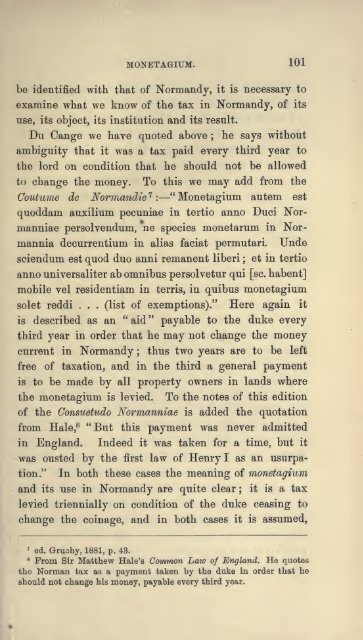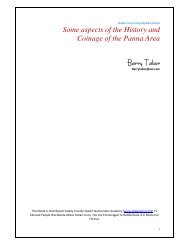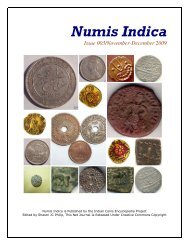- Page 7:
THENUMISMATICANDCHEONICLEJOURNAL OF
- Page 10:
LONDON :PRINTED BY WILLIAM CLOWES A
- Page 13:
CONTENTS.illPAGEI Medaglioni Romani
- Page 16 and 17:
"Z NUMISMATIC CHRONICLE.Agathocles
- Page 18 and 19:
4 NUMISMATIC CHKONICLE.issue struck
- Page 20 and 21:
6 NUMISMATIC CHRONICLE.13of Syracus
- Page 22 and 23:
8 NUMISMATIC CHRONICLE.their being
- Page 24 and 25:
10 NUMISMATIC CHRONICLE.efforts in
- Page 26 and 27:
12 NUMISMATIC CHRONICLE.It is evide
- Page 28:
II.TWO HOAEDS OF COINS OF KOS.(See
- Page 31 and 32:
TWO HOAKDS OF COINS OF KOS. 17proba
- Page 33 and 34:
names NikagorasTWO HOARDS OF COINS
- Page 35 and 36:
III.THE AUTISTIC ENGRAVERS OF TERIN
- Page 37 and 38:
ENGRAVERS OP TERINA AND SIGNATURE O
- Page 39 and 40:
ENGRAVERS OF TERINA AND SIGNATURE O
- Page 41 and 42:
ENGEAVEES OF TEEINA AND SIGNATUEE O
- Page 43 and 44:
ENGRAVERS OF TERINA AND SIGNATURE O
- Page 45 and 46:
ENGKAVERS OF TERINA AND SIGNATURE O
- Page 47 and 48:
ENGRAVERS OF TERINA AND SIGNATURE O
- Page 49 and 50:
ENGRAVERS OF TERINA AND SIGNATURE O
- Page 51 and 52:
ENGRAVERS OF TERINA AND SIGNATURE O
- Page 53 and 54:
ENGRAVERS OF TERINA AND SIGNATURE O
- Page 55 and 56:
ENGRAVERS OF TERINA AND SIGNATURE O
- Page 57 and 58:
ENGRAVERS OF TERINA AND SIGNATURE O
- Page 59 and 60:
ENGRAVERS OF TERINA AND SIGNATURE O
- Page 61 and 62:
ENGRAVERS OF TERINA AND SIGNATURE O
- Page 63 and 64: ENGRAVERS OF TERINA AND SIGNATURE O
- Page 65 and 66: ENGRAVERS OF TERINA AND SIGNATURE O
- Page 67 and 68: ENGRAVERS OF TERINA AND SIGNATURE O
- Page 69 and 70: ENGRAVERS OF TERINA AND SIGNATURE O
- Page 71 and 72: ENGRAVERS OF TERINA AND SIGNATURE O
- Page 73 and 74: ENGRAVERS OF TERINA AND SIGNATURE O
- Page 75 and 76: ENGRAVERS OF TERINA AND SIGNATURE O
- Page 77 and 78: IV.NOTES ON A FIND OF KOMAN REPUBLI
- Page 79 and 80: EL CENTENILLO FIND. 65Centenillo in
- Page 81 and 82: EL CENTENILLO FIND. 67and the tore
- Page 83 and 84: Xo.EL CENTENILLO FIND. 69
- Page 85 and 86: PALMER'S GREEN HOARD. 71HENRY III.L
- Page 87 and 88: PALMER'S GREEN HOARD. 73Newcastle.O
- Page 89 and 90: PALMER S GREEN HOARD.75Obverse.(No
- Page 91 and 92: PALMER'S GREEN HOARD. 77Series II.O
- Page 93 and 94: PALMER'S GREEN HOARD. 79a further g
- Page 95 and 96: PALMER'S GREEN HOARD. 81mints, we m
- Page 97 and 98: PALMER'S GREEN HOARD. 83would sugge
- Page 99 and 100: PALMER'S GREEN HOARD. 85doubt, thou
- Page 101 and 102: PALMER'S GREEN HOARD. 87Cantuaria,
- Page 103 and 104: PALMER'S GREEN HOARD. 89which we ha
- Page 105 and 106: PALMER'S GREEN HOARD. 91cross coina
- Page 107 and 108: PALMERS GREEN HOARD. 93LINCOLNIA (L
- Page 109 and 110: PALMER'S GREEN HOARD. 95IVECESTER (
- Page 111 and 112: PALMER S GREEN HOARD. 97HEEEFORDIA
- Page 113: MONETAGIUM. 99three years, due from
- Page 117 and 118: MONETAG1UM. 103Norman coinage at al
- Page 119 and 120: MONETAGIUM. 105mintage (monetagium)
- Page 121 and 122: WARWICK WILLIAM WKOTH.WARWICK WILLI
- Page 123 and 124: WARWICK WILLIAM WROTH. 109Societies
- Page 125 and 126: MISCELLANEA.IllCollege, in the Univ
- Page 127: Num. Chron. Ser. IV. Vol. XII. PL I
- Page 131: Num. Chron. Ser. IV.Vol. XII. PL II
- Page 135: Num. Chron. Ser. IV. Vol. XII. PI.
- Page 138 and 139: 114 NUMISMATIC CHRONICLE.increase i
- Page 140 and 141: 116 NUMISMATIC CHRONICLE.pointed ou
- Page 142 and 143: 118 NUMISMATIC CHRONICLE.of obtaini
- Page 144 and 145: 120 NUMISMATIC CHRONICLE.We are tem
- Page 146 and 147: 122 NUMISMATIC CHRONICLE.and not fo
- Page 148 and 149: 124 NUMISMATIC CHRONICLE.There woul
- Page 150 and 151: CHBOKICLE.records left by the Egypt
- Page 152 and 153: 128 NUMISMATIC CHRONICLE.should say
- Page 154 and 155: 130 NUMISMATIC CHRONICLE.merchant r
- Page 156 and 157: 132 NUMISMATIC CHRONICLE.the differ
- Page 158 and 159: YIII.GEEEK COINS ACQUIKEDMUSEUM, 19
- Page 160 and 161: 136 NUMISMATIC CHRONICLE.A good spe
- Page 162 and 163: 138 NUMISMATIC CHRONICLE.In weight
- Page 164 and 165:
140 NUMISMATIC CHRONICLE.PI. xxxvii
- Page 166 and 167:
142 NUMISMATIC CHRONICLE.15. Obv. W
- Page 168 and 169:
144 NUMISMATIC CHRONICLE.that the o
- Page 170 and 171:
ANTIOXOY146 NUMISMATIC CHRONICLE.th
- Page 172 and 173:
148 NUMISMATIC CHRONICLE.These two
- Page 174 and 175:
150 NUMISMATIC CHRONICLE.Marcus Aur
- Page 176 and 177:
152 NUMISMATIC CHRONICLE.
- Page 178 and 179:
154 NUMISMATIC CHRONICLE.
- Page 180 and 181:
156 NUMISMATIC CHRONICLE.
- Page 182 and 183:
158 NUMISMATIC CHRONICLE.
- Page 184 and 185:
160 NUMISMATIC CHRONICLE.t-^ O>00 0
- Page 186 and 187:
162 NUMISMATIC CHRONICLE.i.J"2
- Page 188 and 189:
164 NUMISMATIC CHRONICLE.
- Page 190 and 191:
166 NUMISMATIC CHRONICLE.iiB
- Page 192 and 193:
168 NUMISMATIC CHUONICLE.rji* 008a
- Page 194 and 195:
170 NUMISMATIC CHRONICLE.
- Page 196 and 197:
172 NUMISMATIC CHRONICLE.
- Page 198 and 199:
174 NUMISMATIC CHRONICLE.i.
- Page 200 and 201:
176 NUMISMATIC CHRONICLE.
- Page 202 and 203:
178 NUMISMATIC CHRONICLE.
- Page 204 and 205:
180 NUMISMATIC CHRONICLE.intimated
- Page 206 and 207:
182 NUMISMATIC CHRONICLE.to Kouen,
- Page 208 and 209:
184 NUMISMATIC CHRONICLE.of Rouen,
- Page 210 and 211:
186 NUMISMATIC CHRONICLE.money whic
- Page 212 and 213:
188 NUMISMATIC CHRONICLE.were order
- Page 214 and 215:
190 NUMISMATIC CHRONICLE.at St. L6,
- Page 216 and 217:
192 NUMISMATIC CHRONICLE.The author
- Page 218 and 219:
194 NUMISMATIC CHRONICLE.Second Iss
- Page 220 and 221:
196 NUMISMATIC CHRONICLE.VinCUT XPd
- Page 222 and 223:
198 NUMISMATIC CHRONICLE.The issue
- Page 224 and 225:
200 NUMISMATIC CHRONICLE.Salute d'O
- Page 226 and 227:
202 NUMISMATIC CHRONICLE.:Bev *SIT
- Page 228 and 229:
204 NUMISMATIC CHRONICLE.would have
- Page 230 and 231:
206 NUMISMATIC CHRONICLE.He also st
- Page 232 and 233:
208 NUMISMATIC CHRONICLE.a crown an
- Page 234 and 235:
210 NUMISMATIC CHRONICLE.commenceme
- Page 236 and 237:
OriVS212 NUMISMATIC CHRONICLE.publi
- Page 238 and 239:
214 NUMISMATIC CHRONICLE.Obv. The A
- Page 240 and 241:
216 NUMISMATIC CHRONICLE.been carri
- Page 242 and 243:
218 NUMISMATIC CHRONICLE.days later
- Page 244 and 245:
220 NUMISMATIC CHRONICLE.informatio
- Page 246 and 247:
222 NUMISMATIC CHRONICLE.Henry VIII
- Page 248 and 249:
224 NUMISMATIC CHKONICLE.that is, "
- Page 250 and 251:
226 NUMISMATIC CHRONICLE.No.
- Page 252 and 253:
AYTOKPATORI228 NUMISMATIC CHRONICLE
- Page 254 and 255:
NnN230 NUMISMATIC CHRONICLE.militar
- Page 256 and 257:
232 NUMISMATIC CHRONICLE.to treat a
- Page 258 and 259:
234 NUMISMATIC CHRONICLE.British re
- Page 260 and 261:
236 NUMISMATIC CHRONICLE.or in othe
- Page 263:
Num. Chron. Ser. IV. Vol. XII. PI.
- Page 267:
PROCEEDINGSOF THEROYAL NUMISMATIC S
- Page 270 and 271:
4 PKOCEEDINGS OF THE4. Costello, J.
- Page 272 and 273:
6 PROCEEDINGS OF THE19'6 grains) of
- Page 274 and 275:
PROCEEDINGS OF THEattributed to thi
- Page 276 and 277:
10 PROCEEDINGS OF THE4. Numismatist
- Page 278 and 279:
14 PKOCEEDINGS OF THEThe following
- Page 280 and 281:
16 PROCEEDINGS OF THEMARCH 21, 1912
- Page 282 and 283:
18 PROCEEDINGS OF THEstruck by Henr
- Page 284 and 285:
18 PROCEEDINGS OF THEstruck by Henr
- Page 286 and 287:
20 PROCEEDINGS OF THEJUNE 20, 1912.
- Page 288 and 289:
STATEMENT OP RECEIPTS AND DISBURSE-
- Page 290 and 291:
24 PKOCEEDINGS OF THEThe Reports*of
- Page 292 and 293:
26 PROCEEDINGS OF THEmust, however,
- Page 295 and 296:
XIIKAKE AND UNPUBLISHED COINS OF TH
- Page 297 and 298:
COINS OF THE SELEUCID KINGS OF SYRI
- Page 299 and 300:
COINS OF THE SELEUCID KINGS OF SYRI
- Page 301 and 302:
COINS OF THE SELEUCID KINGS OF SYRI
- Page 303 and 304:
COINS OF THE SELEUCID KINGS OF SYRI
- Page 305 and 306:
COINS OF THE SELEUCID KINGS OF SYRI
- Page 307 and 308:
COINS OF THE SELEUCID KINGS OF SYKI
- Page 309 and 310:
COINS OF THE SELEUCID KINGS OF SYRI
- Page 311 and 312:
COINS OF THE SELEUCID KINGS OF SYRI
- Page 313 and 314:
COINS OF THE SELEUCID KINGS OF SYRI
- Page 315 and 316:
COINS OP THE SELEUCID KINGS OF SYRI
- Page 317 and 318:
COINS OF THE SELEUCID KINGS OF SYRI
- Page 319 and 320:
COINS OF THE SELEUCID KINGS OF SYRI
- Page 321 and 322:
COINS OF THE SELEUCID KINGS OF SYRI
- Page 323 and 324:
XIII.HOAKDS OF ROMAN GOLD COINS FOU
- Page 325 and 326:
ROMAN GOLD COINS FOUND AT CORBRIDGE
- Page 327 and 328:
KOMAN GOLD COINS FOUND AT CORBKIDGE
- Page 329 and 330:
ROMAN GOLD COINS FOUND AT CORBRIDGE
- Page 331 and 332:
ROMAN GOLD COINS FOUND AT CORBRIDGE
- Page 333 and 334:
ROMAN GOLD COINS FOUND AT CORBRIDGE
- Page 335 and 336:
ROMAN GOLD COINS FOUND AT COBBRIDGE
- Page 337 and 338:
ROMAN GOLD COINS FOUND AT COEBRIDGE
- Page 339 and 340:
ROMAN GOLD COINS FOUND AT COKBRIDGE
- Page 341 and 342:
EOMAN GOLD COINS FOUND AT CORBRIDGE
- Page 343 and 344:
KOMAN GOLD COINS FOUND AT COKBRIDGE
- Page 345 and 346:
ROMAN GOLD COINS FOUND AT CORBRIDGE
- Page 347 and 348:
ROMAN GOLD COINS FOUND AT COKBRIDGE
- Page 349 and 350:
ROMAN GOLD COINS FOUND AT CORBRIDGE
- Page 351 and 352:
ROMAN GOLD COINS FOUND AT CORBEIDGE
- Page 353 and 354:
EOMAN GOLD COINS FOUND AT CORBKIDGE
- Page 355 and 356:
p. 197, 1097 (123 A.D.).[PL XVII. 2
- Page 357 and 358:
ROMAN GOLD COINS FOUND AT CORBRIDGE
- Page 359 and 360:
ROMAN GOLD COINS FOUND AT CORBRIDGE
- Page 361 and 362:
ttndEOMAN GOLD COINS FOUND AT CORBR
- Page 363 and 364:
ROMAN GOLD COINS FOUND AT COBBRIDGE
- Page 365 and 366:
ROMAN GOLD COINS FOUND AT CORBRIDGE
- Page 367 and 368:
ROMAN GOLD COINS FOUND AT CORBRIDGE
- Page 369 and 370:
ROMAN GOLD COINS FOUND AT CORBRIDGE
- Page 371 and 372:
XIV.THE COINAGE OF THE MALDIVE ISLA
- Page 373 and 374:
THE COINAGE OF THE MALDIYE ISLANDS.
- Page 375 and 376:
THE COINAGE OF THE MALDIVE ISLANDS.
- Page 377 and 378:
Gait, History of Assam, p. 272. Y2T
- Page 379 and 380:
THE COINAGE OF THE MALDIVE ISLANDS.
- Page 381 and 382:
THE COINAGE OF THE MALDIVE ISLANDS.
- Page 383 and 384:
29 Of. Transactions of the Bombay G
- Page 385 and 386:
'THE COINAGE OF THE MALDIVE ISLANDS
- Page 387 and 388:
THE COINAGE OF THE MALDIVE ISLANDS.
- Page 389 and 390:
THE COINAGE OF THE MALDIVE ISLANDS.
- Page 391:
Num. Chron. Ser. IV. Vol. XII. PL I
- Page 395:
Num. Chron. Ser. IV. Vol. XII. PL X
- Page 399:
Num. Cftron. Ser. IV. Vol. XII. PI.
- Page 405:
CORBRIDGE FIND (1911)TRAJAN HADRIAN
- Page 409:
Num. Chron. Ser. IV. Vol. XII. PL X
- Page 413:
Num. Chron. Ser. IV. Vol. XII. PL X
- Page 416 and 417:
334 NUMISMATIC CHRONICLE.article, o
- Page 418 and 419:
336 NUMISMATIC CHRONICLE.instance,
- Page 420 and 421:
338 NUMISMATIC CHRONICLE.Even thoug
- Page 422 and 423:
340 NUMISMATIC CHRONICLE.alsobeen s
- Page 424 and 425:
342 NUMISMATIC CHRONICLE.must take
- Page 426 and 427:
344 NUMISMATIC CHRONICLE.the scales
- Page 428 and 429:
346 NUMISMATIC CHRONICLE.us the bes
- Page 430 and 431:
348 NUMISMATIC CHRONICLE.heap of th
- Page 432 and 433:
350 NUMISMATIC CHRONICLE.the benefi
- Page 434 and 435:
XVI.HELENA N. F.(See Plate XXI.)M.
- Page 436 and 437:
354 NUMISMATIC CHRONICLE.conclusion
- Page 438 and 439:
356 NUMISMATIC CHRONICLE.Neither in
- Page 440 and 441:
358 NUMISMATIC CHRONICLE.distinctly
- Page 442 and 443:
360 NUMISMATIC CHRONICLE.No. 9. Cyz
- Page 444 and 445:
362 NUMISMATIC CHRONICLE.mints of N
- Page 446 and 447:
364 NUMISMATIC CHRONICLE.This ordin
- Page 448 and 449:
366 NUMISMATIC CHRONICLE.For the tr
- Page 450 and 451:
368 NUMISMATIC CHRONICLE.the mark,
- Page 452 and 453:
370 NUMISMATIC CHRONICLE.The Manusc
- Page 454 and 455:
372 NUMISMATIC CHRONICLE.On April 1
- Page 456 and 457:
374 NUMISMATIC CHRONICLE.of the sai
- Page 458 and 459:
376 NUMISMATIC CHRONICLE.of coins d
- Page 460 and 461:
378 NUMISMATIC CHRONICLE.must be th
- Page 462 and 463:
380 NUMISMATIC CHRONICLE.The half-n
- Page 464 and 465:
382 NUMISMATIC CHRONICLE.Duke of Bu
- Page 466 and 467:
384 NUMISMATIC CHRONICLE.Virgin Mar
- Page 468 and 469:
386 NUMISMATIC CHRONICLE.Eev. m.m.
- Page 470 and 471:
388 NUMISMATIC CHRONICLE.under the
- Page 472 and 473:
890 NUMISMATIC CHRONICLE.This salut
- Page 474 and 475:
392 NUMISMATIC CHRONICLE.Troyes.Obv
- Page 476 and 477:
394 NUMISMATIC CHRONICLE.5. Obv. m.
- Page 478 and 479:
396 NUMISMATIC CHKONICLE.St. L6.Obv
- Page 480 and 481:
398 NUMISMATIC CHRONICLE.Amiens.Fro
- Page 482 and 483:
400 NUMISMATIC CHEONICLE.1. Obv. m.
- Page 484 and 485:
402 NUMISMATIC CHRONICLE.mark over
- Page 486 and 487:
404 NUMISMATIC CHKONICLE.Dijon.From
- Page 488 and 489:
406 NUMISMATIC CHRONICLE.Troyes.Poe
- Page 490 and 491:
408 NUMISMATIC CHRONICLE.Paris.Obv.
- Page 492 and 493:
410 NUMISMATIC CHRONICLE.Troyes.Obv
- Page 494 and 495:
VSOOMS.412 NUMISMATIC CHRONICLE.Par
- Page 496 and 497:
MISCELLANEA.A TWELFTH-CENTURY FIND.
- Page 498 and 499:
416 INDEX.Bowrey, his account of th
- Page 500 and 501:
418 INDEX.J.James I, quarter-angfcl
- Page 502 and 503:
420 INDEX.Syracuse, tetradrachm of,
- Page 505:
Num. Chron. Scr. IV. Vol. XII. PL X
- Page 509:
Num. Chron. Ser. IV. Vol. XII. PL X
- Page 513:
LISTOF FELLOWS.OFTHEROYALNUMISMATIC
- Page 516 and 517:
4 LIST OF FELLOWS.ILBCTKD1906 BEATT
- Page 518 and 519:
LIST OF FELLOWS.ELECTED1905 EGGEB,
- Page 520 and 521:
LIST OF FELLOWS.KLKCTED1892 HEWITT,
- Page 522 and 523:
10 LIST OF FELLOWS.ELECTED1905 MESS
- Page 524 and 525:
12 LIST OF FELLOWS.ELHCTED1876 *EOB
- Page 526 and 527:
14 LIST OF FELLOWS.ELECTED1897 WALT
- Page 528:
16 LI?T OF FELLOWS.MEDALLISTSOF THE

















